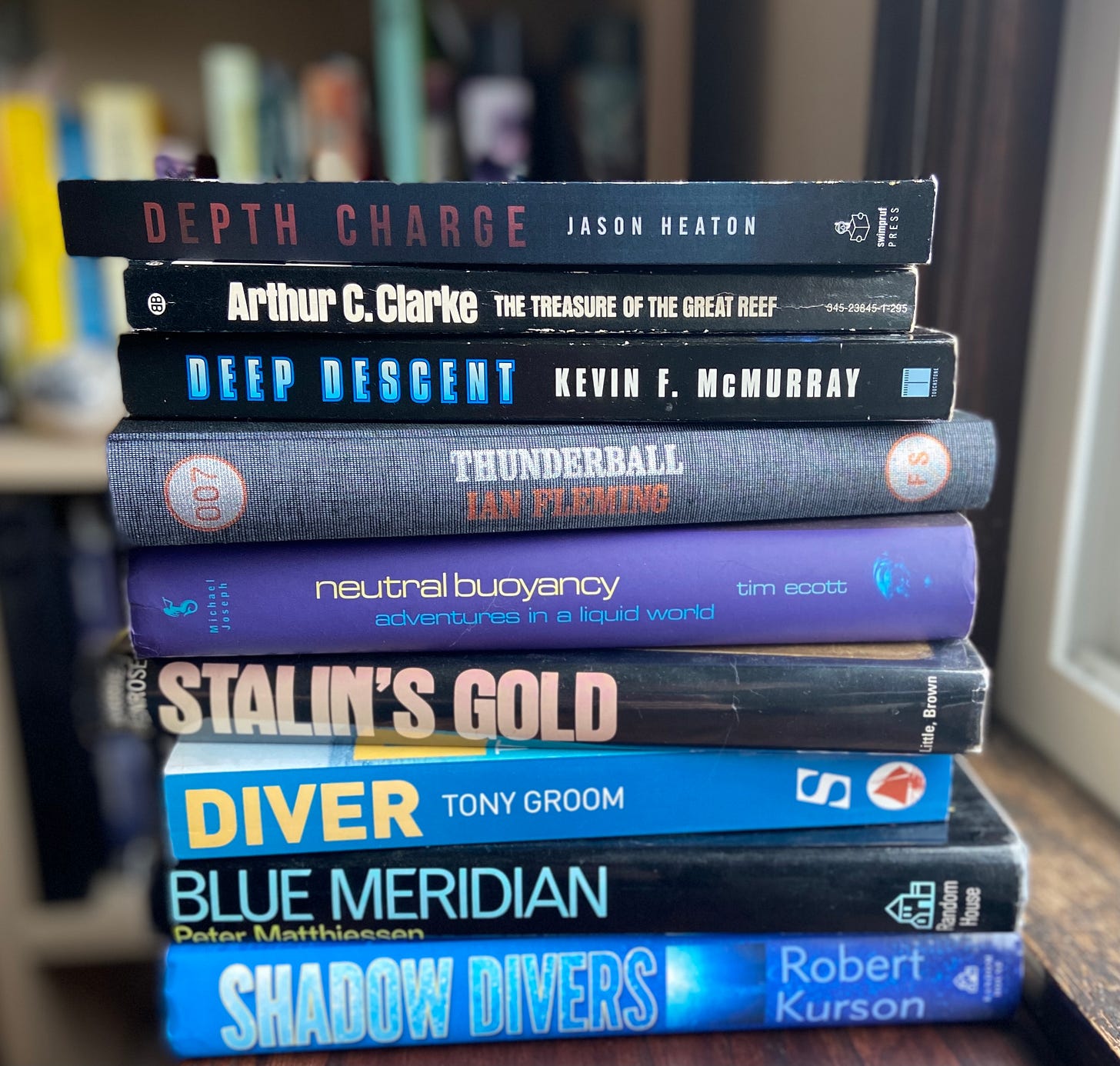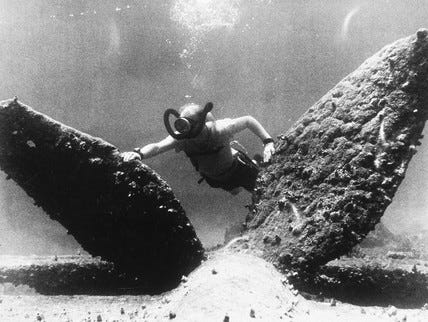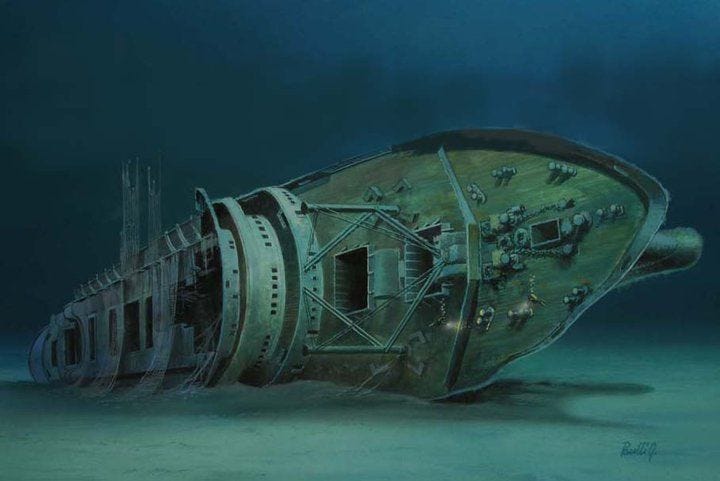Forgive me, but I have books on my mind these days. If you haven’t followed Swimpruf for a while, you might not be aware of my series of themed “bookshelf” articles, in which I recommend some of my favorite adventure reads from different genres. In October, it was the Polar Bookshelf, and in February, the Mountain Bookshelf. This week, fittingly, I present the “Underwater Bookshelf,” a selection of decidedly deep literature. As a diver, these are particularly relevant books to me, with some I can relate to personally, but even if you never dip a toe beyond the beach, the adventures in them are worthy reads. So if you’re done with the cold, polar wastes and the thin air of the peaks, maybe it’s time to put on a scuba tank and dive in to one of these.
I love stories from the early years of scuba. Even using that crude equipment in shallow depths was an adventure—twin-hose regulators, no buoyancy devices, and sketchy decompression theories made every dive death defying, but also thrilling. Imagine being one of the first underwater explorers, even in some of those places that are now holiday dive destinations. I have a few books from that era, the early 1960s, that I like to return to from time to time. But my favorite is from an author far better known for his later work: Arthur C. Clarke. Most people know Clarke as one of the giants of science fiction writing, 2001: A Space Odyssey, and the de factor inventor of the geosynchronous satellite. But in the 1950s, Clarke was a passionate scuba diver, who ultimately emigrated to Sri Lanka where he spent the rest of his life, founding that country’s first dive tourism business and discovering one of history’s most significant underwater treasures. His book, The Treasure of the Great Reef, chronicles the dives on the remote Great Basses Reef that led to the discovery of an ancient shipwreck that contained sacks of silver coins. Clarke is a superb writer—witty, humble, and with an eye for detail. This is only one of several books he wrote about diving, all of which are superb, if you can find them.
My second book is also from a British author who was passionate about diving, but this man made his second home in Jamaica, and this book is a work of fiction. Of course, the author is Ian Fleming, and the book is Thunderball. I know, you probably think you know the story from the James Bond film of the same name. But Fleming is such a good writer who captures the nuances of early diving, that it’s worth reading it in his words. The plot has become almost a cliché or an archetype for underwater thrillers— a sunken nuclear weapon, black-clad diving henchmen with spearguns, slashed air hoses, and murderous sea life. To me, this is the story that stands out as the most “Bondian,” with the elements most sorely missing from current Bond films: the accomplished sportsman taking part in arcane, dangerous disciplines in the name of his work. When it was published in the early 1960s, when diving was in its infancy, it must have seemed so fantastic. It still does.
Coming forward a few years brings us to not only one of my favorite diving books, but one of my favorite books, period: Blue Meridian. It was written by National Book Award winner, Peter Matthiessen, and is the companion book to the 1971 film, Blue Water, White Death, about the worldwide quest to find and film the great white shark for the first time underwater. To call it a “diving book” is to diminish its scope. This is a true life rollicking adventure story that follows a millionaire department store scion and his merry band of filmmakers, champion freedivers, photographers, and even a folk musician as they circle the globe on a refitted whaling ship to chase the least understood fish in the sea. The book is full of personal tensions, philosophical musings, and, of course, harrowing adventure. If I had to take one book to a desert island, this might be it.
Speaking of quixotic adventures, my next book, Stalin’s Gold, by Barrie Penrose, has a similar feel to Blue Meridian, but in the realm of deep shipwreck salvaging instead of shark hunting. Penrose is not as good a writer as Matthiessen (few are), but here the story itself is so fantastic, it doesn’t matter. It involves the quest to find and salvage 465 gold ingots worth 70 million British pounds (in today’s money) that sunk in the hold of HMS Edinburgh, a British warship en route to Russia to pay Stalin’s Soviet government. Not only was the ship sunk by a U-boat in World War II, it lies in 800 feet of very cold, dark water in the Barents Sea. Finding the wreck was difficult, diving it was dangerous, and then finding and salvaging the gold was nearly impossible, especially during the Cold War, in Soviet waters. This is one of the greatest diving adventure stories ever told, in my mind, even if only for the effort made to undertake such a difficult expedition.
Speaking of deep wrecks, perhaps the most famous is the Andrea Doria, the Italian ocean liner sunk in the 1950s in the Atlantic. It has been called, “the Everest of shipwrecks” since it holds such a draw for wreck divers and claims so many lives due to its depth, the currents, and the difficulty of penetrating its labyrinthine interior. Kevin McMurray’s book, Deep Descent, looks at the history of diving on the Doria, mingled with his own experiences diving it, told without too much swagger and an eye on the humanity of those who undertake this adventure. Deep Descent feels a bit like the Into Thin Air of diving books.
Tied with the Andrea Doria are two well known American wreck divers, Richie Kohler and John Chatterton, both of whom are accomplished legends in their field. So it makes sense to move on to one of the best known dive books next, Shadow Divers, which is centered on Kohler’s and Chatterton’s attempts to identify the wreck of a German U-boat in the Atlantic Ocean. Of course much of the book takes place underwater, in a cramped wreck with zero visibility, but there is also plenty of intrigue topside, where the divers undertake years of research and sleuthing to uncover the name of this mysterious submarine they’ve discovered, using clues they bring up from the wreck. The author of Shadow Divers, Robert Kurson, isn’t the most compelling writer, and his style can get tiresome in what is quite a long book. But again, you read this book more for the story and less for the telling of it.
One of the books I bought not long after I got into diving, and into watches, was Diver, by Tony Groom. The book is an autobiographical account of a career in the Royal Navy as a mine clearance diver and then as a North Sea commercial diver. Groom is a diver first and a writer second, but his very personal, very colloquial, take on his interesting work makes for fascinating and sometimes hilarious reading.
Finally, if you’re looking for something with a little less swagger, Tim Ecott’s Neutral Buoyancy is a more gentle and philosophical collection of essays on, “adventures in a liquid world.” Ecott peppers his book with interviews, personal recollection, and some science from the world of diving, from all over our blue planet.
Trust me, I could keep going with this list. My shelves are full of great underwater adventure stories—Island of Angry Ghosts, SEALAB, several by Cousteau, Deep by Jame Nestor, The Last Dive by Bernie Chowdhury, any number of Cussler thrillers, and on and on. But I hope this gets you started on a summer of aquatic reading. If you have other titles you think are worthy, feel free to drop them in the comments.
As a final aside, and relevant to diving books, I’d like to thank those of you who ordered my own foray into this rich genre, Depth Charge. The response has been overwhelming to say the least and the fact that this Substack newsletter is coming to you so late in the week is due to a few full days signing and sending out books. If you’re still interested in ordering, I’m happy to report that, in addition to the signed copies I’ve got on the Depth Charge website, the book is available worldwide (mostly) on Amazon, Barnes & Noble, and other booksellers. I’d love for you all to tune in to my Instagram Live event this next Thursday (29th) at 5:00 Eastern US Time. Also, I’ll be heard on the Worn & Wound Podcast this coming Wednesday and the OT Podcast next Friday. So if you’re not tired of my voice, or hearing about Depth Charge, be sure to tune in!
Happy reading! - JH





I'm gonna need a bigger bookshelf...
Great list. Another would be No Time on Our Side by Roger Chapman. Not a diving book as such but the story of the rescue of Chapman and his colleague from the Vickers Pisces lll submersible in 1973 off the coast of Ireland. I think it still holds the record as the deepest sub rescue ever. Book long out of print but lots on abe books and Amazon.